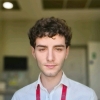Galante Emanuele
Classe Accademica:
Corso di Studio:
Ingegneria Aerospaziale
Anno di ammissione:
2022
Progetti di ricerca:
-
(a.a. 2022-2023) Cell modifications in microgravity and the Random Positioning Machine (RPM)
(Thesis, Presentation) - (a.a. 2023-2024) Microgravity effects upon steroidogenic pathway in bovine ovary cells
Tutor SSAS:
Antonio Musarò
Esperienze di rilievo nazionali e internazionali:
Collaboration in the System Biology Group Lab (Laboratorio Nazionale di Biomedicina Spaziale), led by Prof. Mariano Bizzarri, in the following projects:
- OVOSPACE: analysis of the effects of simulated (RPM) and real (ISS) microgravity on isolated cultures of bGCs and bTCs (NASA and ASI; MINERVA mission, astronaut Samantha Cristoforetti)
- ORION: analysis of the effects of simulated (RPM) and real (ISS) microgravity on co-cultures of bGCs + bTCs treated with myo-inositol (NASA, AXIOM, and ASI; AX-3 mission, astronaut Walter Villadei)
- IREOS-0: scientific officer for the Sapienza biological team for the experimental setup, scientific objectives, design, biocompatibility testing, and subsequent analyses of a MiniLab onboard a recoverable satellite (IRENE-SAT) to study the effects of microgravity on Chlamydomonas reinhardtii (a green alga); in collaboration with SpaceFactory and ASI.
Pubblicazioni:
- Fedeli, V., Unfer, V., Dinicola, S., Laganà, A. S., Canipari, R., Monti, N., Querqui, A., Galante, E., Laurenzi, G., & Bizzarri, M. (2024). Inositol restores appropriate steroidogenesis in PCOS ovaries both in vitro and in vivo experimental mouse models. Cells, 13(1171). https://doi.org/10.3390/cells13141171 IF 5.1
- Manuscript under review: Cutigni, M., Cucina, G., Galante, E., Cerri, M., & Bizzarri, M. (2025). Microgravity impairs endocrine signaling and reproductive health of women. Frontiers in Physiology.


